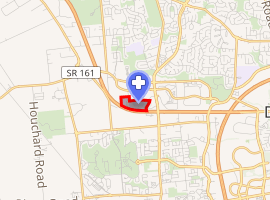Dublin Methodist Hospital
Dublin Methodist Hospital is a, 325,000-square-foot (30,200 m2), primary care hospital in Dublin, Ohio. Dublin Methodist is a member hospital of OhioHealth, a not-for-profit, faith-based healthcare system. It is located off U.S. Route 33 and is accessible from the Central Ohio Transit Authority (COTA) public transport network.[2] Dublin Methodist was the first full-service hospital to be built in Central Ohio in the last 25 years, opening in January 2008.[3]
| Dublin Methodist Hospital | |
|---|---|
| OhioHealth | |
 | |

| |
| Geography | |
| Location | 7500 Hospital Dr, Dublin, Ohio, Ohio, United States |
| Coordinates | 40°6′4.680″N 83°9′57.222″W |
| Organization | |
| Funding | Not-for-profit, faith-based |
| Type | Short Term Acute Care |
| Services | |
| Beds | 107 [1] |
| History | |
| Opened | 2008 |
| Links | |
| Website | www |
| Lists | Hospitals in Ohio |
As part of the OhioHealth system of hospitals, Dublin Methodist includes services such as 24-hour emergency department, intensive care beds and private rooms, women’s health services (including obstetrics), as well as inpatient and outpatient surgical services in orthopedics, spine and pain management.
Design and construction

Dublin Methodist was designed with an emphasis on family spaces, natural light and a focus on comfort such as all private rooms with a sleeping couch for guests. The hospital was also intended to be a quiet environment including the use of electronic communication. There is no overhead paging, and special ceiling tiles are used in common areas to absorb sound. Hospital courtyards and rooftops include 13 gardens.[4]
It was named one of the “Most Wired” hospitals in America in a survey that assessed the ways hospitals use information technologies for quality, customer service, public health and safety, business processes and workforce issues.[5]
The hospital cost $150 million to construct.[6] The contractor on the project was Elford/Gilbane Building Company. The architect during construction was Karlsberger and built by Elford/Gilbane Building Company.[7]
Services
Dublin Methodist Hospital received the Outstanding Patient Experience Award in 2017.[8]
As part of the OhioHealth system, Dublin Methodist has specially monitored eICU intensive care beds monitoring patients 24/7 with video, audio and vital sign monitors linking to intensive care experts at Riverside Methodist Hospital to enhance the safety for critically ill patients. To preserve patients privacy the eICU equipment has no recording capabilities with either the audio or video system and the camera is only turned toward the patient periodically.[9]
Critical care beds are equipped to adapt to a patient's changing condition by bringing monitoring equipment to the bedside, rather than moving the patient throughout the hospital.
Outpatient and inpatient services at Dublin Methodist Hospital include:[10]
|
For the use of staff, patients and visitors the hospital has two catering establishments Starbucks and The Waterfall Café.[11]

References
- "American Hospital Directory - OhioHealth Dublin Methodist Hospital". ahd.com. Retrieved 28 May 2018.
- "Community Plan, Dublin Ohio, Public Transportation". communityplan.dublinohiousa.gov. Retrieved 28 May 2018.
- "Health Design - Dublin Methodist Hospital". healthdesign.org. Retrieved 28 May 2018.
- "Dublin Methodist Hospital, About Us". ohiohealth.com. Retrieved 28 May 2018.
- "Nine OhioHealth hospitals named 2017 Most Wired". newsroom.ohiohealth.com. Retrieved 28 May 2018.
- "Health Design - Dublin Methodist Hospital". healthdesign.org. Retrieved 28 May 2018.
- "Bruner corp Healthcare Projects". brunercorp.com. Retrieved 28 May 2018.
- "Outstanding Patient Experience Award - 2017". healthgrades.com. Retrieved 28 May 2018.
- "eICU System". ohiohealth.com. Retrieved 28 May 2018.
- "Healthcare Services at Dublin Methodist Hospital". ohiohealth.com. Retrieved 28 May 2018.
- "Dublin Methodist Hospital, Amenities And Accommodations". ohiohealth.com. Retrieved 28 May 2018.